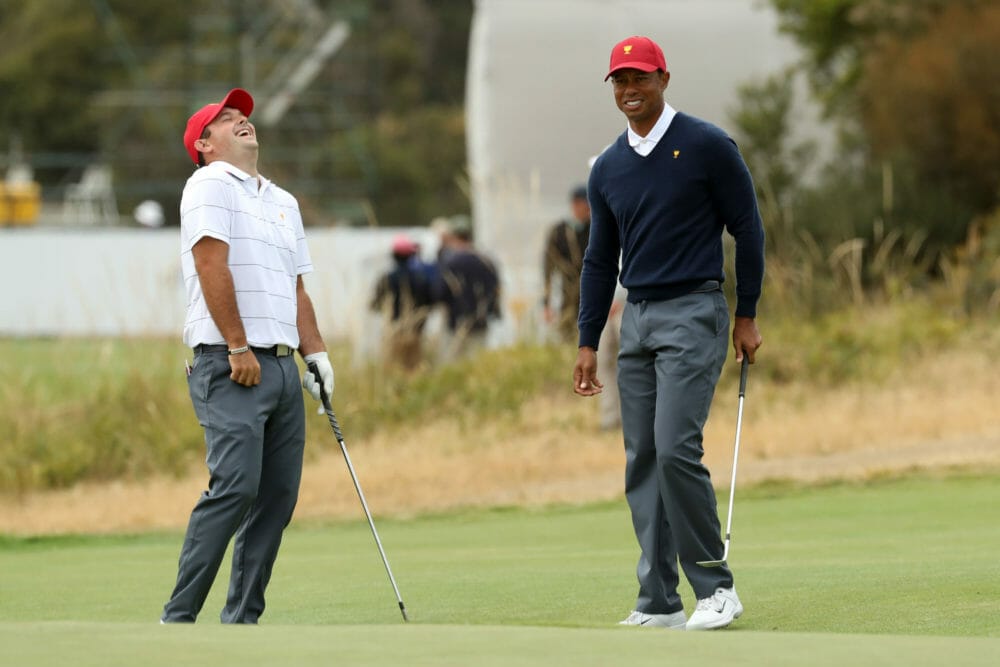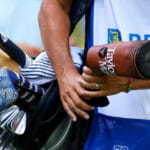The schoolyard romance – we’ve all been there. One minute you’re playing a game of kiss chasing, the next you’re nine years old and you’ve found the one; the pair of you plotting your future together in blissful ignorance as the others play spin the bottle in forlorn desperation. But life can be so cruel. You catch her one day after school behind the prefab taking a bite out of another boy’s Curly Wurly and you almost choke on your packet of Meanies before retreating into the shadows.
The wounds heal of course, though the scars run deep. But I’ve since forgiven Sarah McNally, just like Pope John Paul II forgave his would be assassin in 1983. But would the Pontiff have been so forgiving if Patrick Reed had deliberately improved his lie to beat him by one point in the Vatican’s annual golf day?
Cheating in sport, both dishonourable and unacceptable, remains a widespread problem. We associate athletics and cycling with drugs and deceit. We have exposed FIFA, the governing body of football, for its years of boardroom corruption. Our sports pages are filled with more gossip than glory. Match fixing allegations, blood scandals, diving and deception repeatedly overshadow the feats of talent that should feature most. Yet, I would argue, that of all sports, golf has retained its integrity above all others.
Without trust, the game of golf wouldn’t exist. The laws of the game have long been upheld by its participants and the onus remains on players to call out foul play. But with the ethics of the game held in such high esteem, be warned that an accusation of rule bending levelled at a golfer will rarely be warmly accepted.
“No, of course not,” Reed reacted when asked if he was a cheat. “It’s not the right word to use.
“If you’re intentionally trying to do something, that would be considered cheating. But I wasn’t intentionally trying to improve a lie or anything like that because if I was it would have been a really good lie and I would have hit it really close.”
Reed blamed a misleading camera angle for his guilty verdict but as far as excuses go, that’s up there with Father Ted Crilly and that money just resting in his account. Given the amount of times Captain America’s found himself in sand and successfully managed to avoid it prior to playing a shot in his pro career to date, it’s odds on that he felt the sand move as he drew his club back on rules infraction one. Only a fool would afford Reed the benefit of the doubt in this instance but if mercy is your thing, then take two of the fiasco delivered the verdict; guilty, caught red handed, confess and accept the consequences.
Instead, Reed, who returns to the golf course this week as part of Tiger Woods’ Presidents Cup team, has pleaded not guilty. He’s been caught with his hand in the cookie jar but insists he tripped and fell and although he’ll undoubtedly feel the full force of the International crowd in Australia having brought golf’s great values into disrepute, there’s little consolation. Reed revels in the role of the villain and it’s up to golf’s governing bodies to issue his blatant cheating with the appropriate punishment. Unfortunately, Reed’s no lone wolf in this sphere.
Sadly, golfers cheat in a number of ways and cheating is much more prevalent when the cameras aren’t rolling, particularly in the realm of amateur golf. There’s the sufferer of a persistent duck-hook whose ball always seem to hit the tree at just the right angle to grant a swing. There’s the shaky putter who by the time they’ve marked and replaced their ball, have managed to halve the length of their putt, or there’s the much more obvious, numerically deficient scorekeepers who struggle to count beyond bogey when totting up their strokes.
It’s been said that anything worth achieving is worth an honourable and honest effort, however, sometimes the size of prize lures good people to the dark side. It’s here I’ll dismount my high horse and probably roll my ankle and share with you the tale of a friend of a friend who found his moral compass twisted on an innocent trip to a driving range in New Zealand.
Perched on a miniscule island 150-yards from the tee was a Hole-in-One Challenge offering contestants a $1,000 bounty for pulling off the impossible shot. There wasn’t even an entry fee, nothing at stake but reward and with the bottom of the cup invisible from the hitting area, a slam dunk was their only hope of achieving the magic ‘one’.
An impossible shot for the mere mortal but for a group of penny strapped and thirsty Irish backpackers, who noticed a serious lack of CCTV and a whole pile of misplaced trust, hope sprang eternal.
They identified the most capable swimmer amongst them who stripped down to his jocks and made a beeline like Phelps for the flag. The others continued hitting as normal, maintaining calm until he reached the floating green, dropped the ball in and swam to shore elsewhere. When he’d made land, Podge, the most capable golfer of the group, held a striking finish and on a count of three, the boys erupted, creating enough noise to prise the driving range owner from his office, cheque book in hand. The lucrative ace made the local paper, a half dozen dishevelled paddies pictured in print grinning like the Cheshire Cat. Funnily enough, it was the first time the prize had been won since another Irish backpacker, living off his last dollar, took on the shot. What were the chances?
























Leave a comment